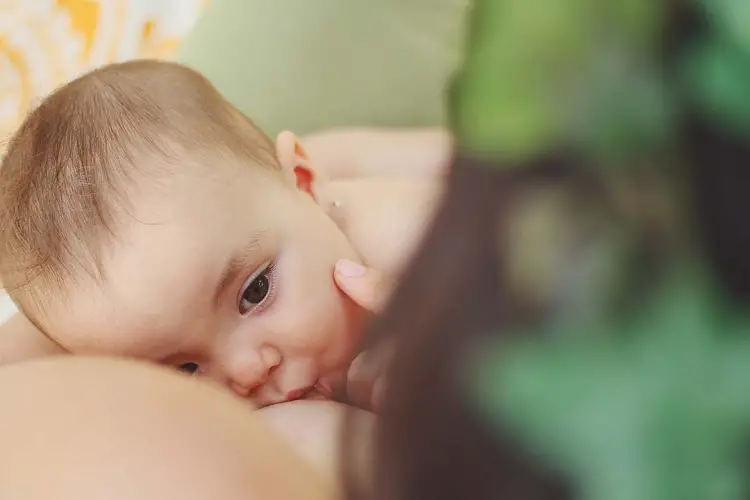Breastfeeding comes with a lot of cute noises and some unusual sounds from babies. Sometimes, parents might not be able to differentiate the normal sounds from the abnormal ones.
This is why there is a need for new parents to at least try to acquaint themselves with the sounds babies make during breastfeeding. Knowing these sounds would help them detect breastfeeding problems very early.
Babies are known to make grunting, swallowing, and gentle sucking sounds during breastfeeding. Some babies make clicking sounds too.
Unlike the other sounds, we hear, clicking when breastfeeding is not normal. In this article, we’ll explore clicking during breastfeeding and what it means. Read on.
What Does Clicking When Breastfeeding Mean?
Clicking when breastfeeding could mean a myriad of things, but the major thing that clicking during breastfeeding means is that your baby is not properly latched.
This simply means that your baby’s position while it breastfeeds is not comfortable enough for it. Below are other causes of clicking when breastfeeding.
1. Full and Big Breasts
After delivery, the breasts are usually big and full of milk. Sometimes, the baby might find it difficult to feed properly because the breasts are engorged. The baby might begin to struggle to feed as much as it wants. It is that struggle that would cause the baby to make the clicking sounds.
2. Abnormality in the Mouth
If you notice clicking sounds when breastfeeding your baby, it could an indication that your baby has an abnormality in his mouth.
This abnormality could be a tongue tie or an unusually high palette. A tongue-tie can affect your baby’s speech greatly in the future if nothing is done about it.
When you notice that clicking sound, take some time and look into your baby’s mouth. You may be unable to find the abnormalities by yourself.
That’s where the pediatrician comes in. Do not waste any time going to the hospital.
3. Too Much Milk
Excess milk production can also cause your baby to make the clicking sound during breastfeeding.
When your breasts produce more milk than your baby’s mouth can control, your baby would find it difficult to feed well. In a bid to keep up with the great flow of milk, your baby would struggle, thereby making clicking sounds.
4. Infections
Clicking when breastfeeding can also be attributed to infections, for example, thrush. Thrush is a type of yeast infection that occurs in a baby’s mouth.
This yeast infection would make your baby’s mouth sore and painful. You know the difficulty and pain that come with eating with a sore mouth, right? That’s what the baby goes through.
If your baby has thrush, it would make the clicking sound while breastfeeding. If you look carefully, you’d notice that your baby’s cheeks dimple as the clicking sound comes on.
Except your baby has natural dimples, dimpling cheeks during breastfeeding should never be overlooked. It could be a symptom of something very serious.
5. Broken Seal
During breastfeeding, your baby creates a seal around your breast with its lips. If the seal gets broken, your baby would make clicking sounds.
6. Ear Infection
A strong suck is much needed for successful breastfeeding. If your baby has an ear infection, this may limit his or her ability to suck properly due to pressure build-up.
When a baby sucks, there’s a pressure build-up inside the ear. If their ear is infected, there’s every chance it will cause them pain.
To ease the pain, they’ll need to take a break from their breastfeeding position to relax the jaw.
7. Sucking Too Fast
Clicking when breastfeeding can also happen if the baby sucks too fast. Some babies suckle with so much eagerness that they end up taking in more milk than they can control.
Clicking isn’t the only thing that it can lead to, it can also cause choking. If your baby sucks too fast, you need to devise a method to make your baby slow down.
You can do this by taking out your breast from its mouth at calculated intervals so it can gulp in the air and get calm again. You don’t have to worry too much about your baby sucking too fast, it stops with age.
As the baby grows, the greater control it gains during its feeding process. Babies outgrow a lot of things quickly.
Other Signs to Watch For
If clicking sounds are signs of a breastfeeding problem, chances are that they may be accompanied by a few other symptoms. Here are a few things to look out for:
- Dimpling of the cheeks: It is quite difficult to differentiate between a sucking sound and a clicking sound sometimes. If your baby is born with dimpled cheeks along with the noise, there’s every chance it could be a true clicking sound.
- Sore Nipple: The breastfeeding experience shouldn’t be a painful one. Sore nipple and breast pain of any kind may be a good sign that something is wrong.
- Twisted nipple immediately after feeding: If the nipple looks wrinkled or slanted like a new tube of lipstick, this may be a sign of tongue-tie. This usually comes with pain and damage to the skin of the nipple. This can also happen when there’s too much milk in your breast – your baby will use his/her tongue or gums to staunch the flow of milk.
- Clear mouth trauma: Having a look at your baby’s mouth can help you see if there is an infection or abnormality causing latch or nursing difficulties. You must check with your doctor or lactation consultant to truly diagnose any problem.
- Weight gain problem: When breastfeeding is smooth and free of stress, babies gain weight easily and as well hit milestones at an appropriate pace. Having a baby is having a hard time putting on weight accompanied by clicking noises could be a sign so don’t hesitate to talk with your doctor about it.
Read: Breastfeeding Tips For First Time Moms
What Is The Best Latching Position To Avoid Clicking When Breastfeeding?

Now that we know that clicking sounds when breastfeeding is majorly caused by improper latching, we would educate you on the best position that your baby should be in during breastfeeding to avoid clicking.
Firstly, your baby should have more than a whole inch of your breast in its mouth. That is the areola. The areola of your breast is that dark part where the nipple stays. Also, your baby’s tongue should lay completely low in its lower gum.
Lastly, your baby’s body must face the breasts completely. As you can see it’s quite easy to do. Sometimes, you might have to make adjustments for your baby in regards to position.
You know, no two babies are the same. So, different babies might require different positions during breastfeeding. No matter the position you and your baby adopt, make sure that your baby is comfortable. Your comfort matters too.
How To Create A Balance During Breastfeeding
If your baby finds it hard to position properly when breastfeeding, you would need to create a balance for it to latch on properly. Here are some helpful tips for you.
- Pillows: You can bring your baby to the level of your breasts by propping it up with pillows.
- Stools/Chair: You can also use stools to make for maximum comfort for you and your baby during breastfeeding. Placing your legs on a stool during breastfeeding bears a lot of comforts. It would interest you to know that there are lots of stools made especially for breastfeeding. Go for them!
Read: Can I Drink Emergen C While Nursing
Other FAQ’s
Is Breastfeeding Supposed To Hurt?
A lot of lactating mothers complain that breastfeeding hurts. Breastfeeding is not supposed to hurt at all. If you feel pain during breastfeeding, do not hesitate to visit the doctor.
Does Clicking Mean Bad Latch?
Oftentimes, a clicking during breastfeeding could indicate that your baby is not latched on correctly. That is the baby is not able to maintain a good hold on your breast with their mouth during breastfeeding which causes them to constantly adjust their tongue and lips.
When Do Babies Start Making Clicking Sounds?
The strange sounds your baby makes might be pretty enticing. But this sound could help prepare the baby for saying her first words.
For instance, around five and eight months, you might notice your baby has been able to blow bubbles, click her tongue on the roof of her mouth or smack her lips.
Does Clicking Always Mean Tongue Tie?
Inability to nurse your baby correctly can lead to low weight gain and fussiness. A revealing sign of a baby with a tongue-tie is a possible indication of a clicking sound when feeding, but it can also be a sign that you need to adjust or position your baby properly at your breast, so just check to make sure.
Related Posts:
Conclusion
I hope this article has given in-depth discussion to answer the question of what causes clicking when breastfeeding. If you notice any sound during breastfeeding, do not ignore it! You would be doing your baby harm if you do.
It’s best advised to talk to your doctor or a lactation consultant if you hear clicking noises, whether unsure or not.
They’ll be in the position to properly examine and diagnose any issues you may be experiencing while providing safe and effective treatment options.
